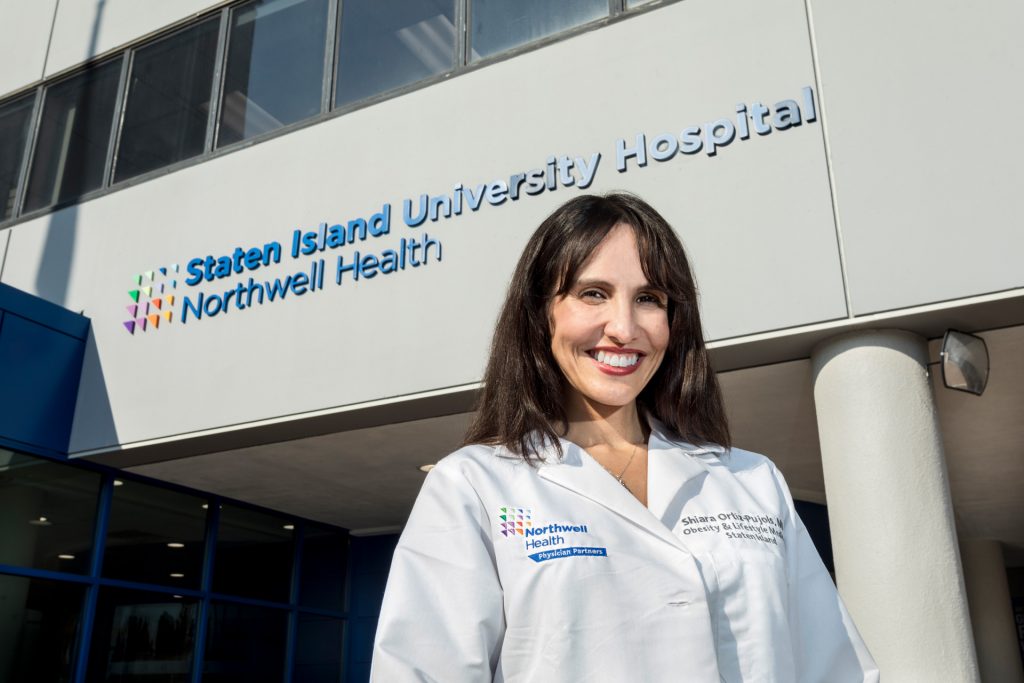OVERCOMING A BATTLE WITH CHILDHOOD OBESITY HERSELF, THIS PREVENTIVE MEDICINE SPECIALIST AND CHAMPION OF SIUH’S WEIGHT MANAGEMENT PROGRAM SPEAKS TO THE COMPLEXITY OF THE OFT-MISUNDERSTOOD DISEASE, AND DETAILS THE MANY WAYS SIUH IS OFFERING PATIENTS A PATH FORWARD THROUGH A COMPASSIONATE, WHOLE-BODY APPROACH TO CARE
BY AMANDA McCOY PHOTOS BY AMESSE PHOTOGRAPHY
For Shiara Ortiz-Pujols, MD, MPH, a board-certified preventive medicine, obesity, and lifestyle medicine specialist, medical weight loss is deeply personal. The Brooklyn-born physician battled obesity throughout her childhood, experiencing firsthand the pervasive bias and judgment surrounding the complex disease, even in the medical community. (Obesity wasn’t even classified as a disease by the American Medical Association until 2013, previously considered a national health issue). The first person in her family to pursue higher education, Dr. Ortiz-Pujols was originally interested in surgery when she began her rotations as a med student, but her interactions with patients with obesity motivated a shift in focus.

“There is no other disease where it’s acceptable to judge someone based on their appearance,” said Dr. Ortiz-Pujols, who joined Staten Island University Hospital’s newly formed Weight Management Program as a leader earlier this year. “People often speak about obesity as a lack of willpower, and it’s so much more complex than that. Growing up, I personally experienced bullying and weight bias, and it was traumatizing.”
Obesity rates in the United States are climbing. According to data from the Centers for Disease Control and Prevention, the U.S. obesity rate sits just over 42%, a stark 26% increase since 2008. One in five adolescents between the ages of 10 and 17 have obesity, exacerbated by pandemic-era impacts like increased food insecurity, decreased activity levels, and changes in eating habits. Obesity, Dr. Ortiz-Pujols explained, is a highly complex, chronic disease that can lead to a number of other life-threatening conditions, such as heart disease, stroke, type 2 diabetes, and even some forms of cancers.

With her appointment, Dr. Ortiz-Pujols brings to SIUH a wealth of experience in creating clinical weight management models that focus on whole-per son care. (Prior to joining the hospital, she served as the medical director of obesity medicine at MedExpress/Optum Health, where she co-developed and grew a national weight loss program available to all employees as part of their benefits package.) She believes in a team approach, one that unites experts across several modalities, from registered nurses and GI physicians to sleep specialists and bariatric surgeons, to offer patients a comprehensive roadmap to wellness that’s tailored to their specific needs. Patients have access to personalized dietary and physical activity guidance, weight loss medications, surgical procedures like gastric bypass and sleeve gastrectomy, and more.
“We offer a slightly different plan for each patient, but they all support the same goal,” noted the physician, who’s fluent in both Spanish and English. “We take into account all the different considerations that are affecting this person’s quality of life: past and present habits and lifestyles, family medical history, medical conditions, mental health, medications they are currently taking, and more.”
Rather than relying on standardized one-size fits-all metrics, Dr. Ortiz-Pujols examines several factors to capture the whole picture of a patient’s health. This approach provides a much fuller insight into the patient’s individual needs. Traditional measurements like body mass index (BMI), she explained, are not always an accurate representation of health.

“Dwayne ‘The Rock’ Johnson is a great example,” she said. “If you take his height and weight, his BMI would be in the obesity range, but I think anyone who takes one look at him knows this isn’t accurate. Waist circumference, on the other hand, directly measures fat accumulation around the waist, which is more closely associated with increased risk for cardiovascular diseases, Parkinson’s disease, and several types of cancer.”
One of the most common drivers of obesity is poor food and health literacy, explained Dr. Ortiz-Pujols, which isn’t linked to a person’s education level or socioeconomic background. “Having access to a registered dietician is invaluable,” she continued. “They can speak to the power of food as medicine. It’s one thing to tell someone to eat more fruits and vegetables and less processed foods, but it’s another to work with someone hand-in-hand to make that goal a reality.”
Plans for hosting teaching kitchens on site are also in the works, with a goal to offer families practical guidance for cooking healthier meals at home.
Looking ahead, Dr. Ortiz-Pujols noted that while the medical community has made significant strides over the last decade, there’s still a long road ahead. “There’s historically been a lack of resources for patients with obesity,” noted Dr. Ortiz-Pujols. “It’s going to require legislation and better parity in the medical field. There aren’t a lot of obesity medicine specialists, but I’m hoping that changes as our understanding of the disease grows. There’s also an incredible amount of new treatment medications in the pipeline, each more effective and potent than the last. The potential for truly making an impact in our patients’ quality of life is tremendous.”

SIUH is in the process of launching an adolescent program to address the alarming rise in childhood obesity, a particularly meaningful project for Dr. Ortiz-Pujols. “When people see me now, they would never think I once struggled with obesity,” she said. “But I know it’s a long-term condition that requires continuous management. There’s no final date on your treatment plan. COVID-19 caused a dramatic increase in obesity rates in adolescents. Studies show that adolescent patients are far less likely to receive care. That means that, in the future, when these individuals are 25 or 30, they are going to potentially develop diseases previously seen in people in their 60s or 70s. We have to offer the proper treatment and support now.”
Staten Island University Hospital
Weight Management Program
